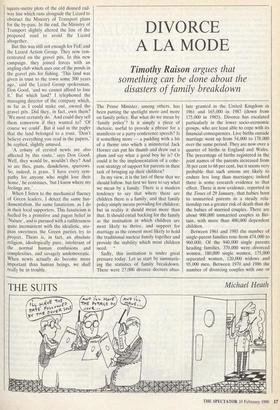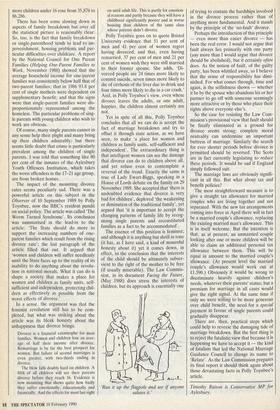DIVORCE A LA MODE
Timothy Raison argues that
something can be done about the disasters of family breakdown
The Prime Minister, among others, has been putting the spotlight more and more on family policy. But what do we mean by 'family policy'? Is it simply a piece of rhetoric, useful to provide a phrase for a manifesto or a party conference speech? Is it something more — a pudding with a bit of a theme into which a ministerial Jack Horner can put his thumb and draw out a plum and say what a good boy he is? Or could it be the implementation of a cohe- rent strategy of support for parents in their task of bringing up their children?
In my view, it is the last of these that we should follow, but first we have to say what we mean by a family. There is a modern tendency to say that where there are children there is a family, and that family policy simply means providing for children; but in reality it should mean more than that. It should entail backing for the family as the institution in which children are most likely to thrive, and support for marriage as the cement most likely to hold the traditional nuclear family together and provide the stability which most children need. • Sadly, this institution is under great pressure today. Let us start by summaris- ing the statistics of family breakdown. There were 27,000 divorce decrees abso-
lute granted in the United Kingdom in 1961 and 165,000 in 1987 (down from 175,000 in 1985). Divorce has escalated particularly in the lower socio-economic groups, who are least able to cope with its financial consequences. Live births outside marriage went up from 54,000 to 178,000 over the same period. They are now over a quarter of births in England and Wales. The percentage of births registered in the joint names of the parents increased from 38 per cent to 68 per cent, but it seems very probable that such unions are likely to endure less long than marriages; indeed there is some research evidence to that effect. There is now evidence, reported in the Times of 29 January, that babies born to unmarried parents in a steady rela- tionship run a greater risk of death than do the babies of married couples. There are about 900,000 unmarried couples in Bri- tain, with more than 400,000 dependent children.
Between 1961 and 1985 the number of single-parent families rose from 474,000 to 960,000. Of the 940,000 single parents heading families, 370,0(X) were divorced women, 180,000 single women, 175,000 separated women, 120,(X)0 widows and 95,000 men. Between 1970 and 1986 the number of divorcing couples with one or more children under 16 rose from 35,876 to 86,286.
There has been some slowing down in aspects of family breakdown but over all the statistical picture is reasonably clear. So, too, is the fact that family breakdown or single-parenthood tends to lead to im- poverishment, housing problems and par- ticular difficulties over childcare. A report by the National Council for One Parent Families (Helping One-Parent Families to Work, November 1988) showed that the average household income for one-parent families was consistently below half that of two-parent families; that in 1986 93.8 per cent of single mothers were dependent on supplementary benefit; and that the signs were that single-parent families were dis- proportionately represented among the homeless. The particular problems of sing- le parents with young children who wish to work are obvious.
Of course, many single parents cannot in any sense help their plight and many bring up their children admirably; but there seems little doubt that crime is particularly prevalent among the children of single parents. 1 was told that something like 80 per cent of the inmates of the Aylesbury Youth Offences Institution, which takes the worst offenders in the 17-21 age group, are from broken homes.
The impact of the mounting divorce rates seems peculiarly sad. There was a powerful article on this subject in the Observer of 10 September 1989 by Polly Toynbee, now the BBC's resident pundit on social policy. The article was called 'The Worm Turned Syndrome'. Its conclusion was summarised in the lead-in to the article: 'The State should do more to support the increasing numbers of one- parent families which result from the rising divorce rate'; the last paragraph of the article filled that out. It argued that `women and children will suffer needlessly until the State faces up to the reality of its inability to do anything about the revolu- tion in national morals. What it can do is shape a society that makes a place for women and children as family units, self- sufficient and independent, protecting chil- dren as effectively as possible from the worst effects of divorce.'
In a sense, the argument was that the feminist revolution still has to be com- pleted, but what was striking about the article was its bleak honesty about the unhappiness that divorce brings.
Divorce is a financial catastrophe for most families. Women and children lose an aver- age of half their income after divorce. Remarriage is by far the best prospect for women. But failure of second marriages is even greater. with two-thirds ending in divorce.
The blow falls doubly hard on children. A fifth of all children will see their parents divorce before they reach 16. Evidence is now mounting that shows quite how badly they suffer emotionally, educationally and financially. And the effects for most last right on until adult life. This is partly for emotion- al reasons and partly because they will have a childhood significantly poorer and in worse housing than children of the same class whose parents didn't divorce.
Polly Toynbee goes on to quote Bristol University evidence that 51 per cent of men and 41 per cent of women regret having divorced, and that, even having remarried, 37 per cent of men and 21 per cent of women wish they were still married to their former spouse. She adds, `Di- vorced people are 24 times more likely to commit suicide, seven times more likely to die of cirrhosis of the liver due to drink and four times more likely to die in a car crash.' And, in Polly Toynbee's view, even where divorce leaves the adults, or one adult, happier, the children almost certainly are not.
Yet in spite of all this, Polly Toynbee concludes that all we can do is accept the fact of marriage breakdown and try to offset it through state action, as we have seen, to make 'a place for women and children as family units, self-sufficient and independent'. The extraordinary thing is that intelligent women can see the damage that divorce can do to children above all, and yet refuse even to contemplate a reversal of the trend. Exactly the same is true of Lady Ewart-Biggs, speaking in a House of Lords debate on the family on 29 November 1989. She accepted that 'there is undoubted evidence that divorce is very bad for children', deplored `the weakening or diminution of the traditional family', yet argued that 'it is important to accept the changing patterns of family life by recog- nising single parents and reconstituted families as a fact to be accommodated'.
The essence of this position is feminist; and although it is anything but shrill in tone (it has, as I have said, a kind of mournful honesty about it) yet it comes down, in effect, to the conclusion that the interests of the child should be ultimately subser- vient to the right of the mother to be free (if usually miserable). The Law Commis- sion, in its document Facing the Future, (May 1988) does stress the interests of children, but its approach is essentially one 'Run it up the flagpole and see if anyone salutes it.' of trying to contain the hardships involved in the divorce process rather than of anything more fundamental. And it stands by the principle of the `no-fault' divorce.
Perhaps the introduction of this principle — even more than easier divorce — has been the real error. I would not argue that fault always lies primarily with one party (any more than I would argue that divorce should be abolished), but it certainly often does. As the notion of fault, of the guilty party, has been whittled away, so I believe that the sense of responsibility has dimi- nished. For what comes through, time and again, is the selfishness shown — whether it be by the spouse who abandons his or her partner to go off with someone seemingly more attractive or by those who place their rights above everyone else's.
So the case for resisting the Law Com- mission's provisional view that fault should be finally eliminated as a ground for divorce seems strong; complete moral neutrality can undermine an important buttress of marriage. Similarly the search for ever shorter periods before divorce is permitted should be reversed. The Scots are in fact currently legislating to reduce these periods. It would be sad if England simply followed suit.
The marriage laws are obviously signifi- cant in all this. But what about tax and benefit policies?
The most straightforward measure is to give a straight tax allowance for married couples who are living together and not separated. With the new tax arrangements coming into force in April there will in fact be a married couple's allowance, replacing the existing married man's allowance. This is in itself welcome. But the intention is that, as at present, an unmarried couple looking after one or more children will be able to claim an additional personal tax allowance between them. This will be equal in amount to the married couple's allowance. (At present level the married couple's allowance would work out at £1,590.) Obviously it would be wrong to discriminate heavily against children's needs, whatever their parents' status; but a premium for marriage in all cases would give the right signal. At the same time if only we were willing to be more generous over child benefit, the need for a special payment in favour of single parents could gradually disappear.
There are, then, practical steps which could help to reverse the damaging tide of marriage breakdown. But the first thing is to reject the fatalistic view that because it is happening we have to accept it — the kind of fatalism that led the National Marriage Guidance Council to change its name to `Relate'. As the Law Commission prepares its final report it should think again about those devastating facts in Polly Toynbee's article.
Timothy Raison is Conservative MP for Aylesbury.



















































 Previous page
Previous page